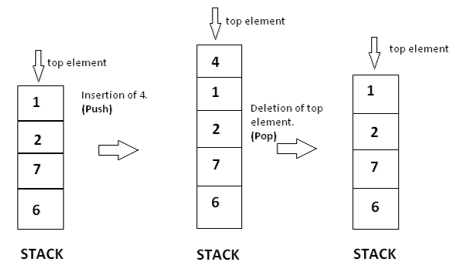Module 1 (Stack) - Algoritma-dan-Pemrograman-ITS/StrukturData GitHub Wiki
- Top - the top node within a stack.
Stack is a dynamic data structure that follows the Last In First Out (LIFO) principle. Under this principle, the last element to be inserted into a Stack will be the first element to be deleted when a function to delete a node is called. One way to visualize a Stack is by using a stack of plates, where every time a new plate is going to be placed, it will be located on the top of the stack.

- isEmpty - to check whether the given Stack is empty or not.
- size - to get the size data of the Stack.
- push - to add new data at the top.
- pop - to remove a data at the top.
- top/peek - to get the data at the top.
One example of a Stack implementation is to convert an infix notation to a postfix one. Infix notation is a mathematical expression commonly used by human to solve mathematical problems, for example: x + y / (10 + z). But, computers are not able to correctly understand such notation easily. In order to work around it, computers will convert such expression into a postfix notation, for example x y + 10 z + /. Where such conversion can happen thanks to the implementation of Stack data structure.
The full implementation of Stack can be accessed here.
Stack can be implemented by utilizing a Singly Linked List by treating the head on the Linked List as the Top of the Stack.
The Time Complexity of all operation on a Stack is done constantly O(1).
-
Nodes can be represented by a
structnamed StackNode that stores anintdata and a reference to the next nodenext.typedef struct stackNode_t { int data; struct stackNode_t *next; } StackNode;
-
typedef struct stack_t { StackNode *_top; unsigned _size; } Stack;
#include <bits/stdc++.h> using namespace std; int main(){ stack<int> st; return 0; }
-
Checking whether a stack is empty or not can be done by checking whether the
topof the stack isNULLor not.bool stack_isEmpty(Stack *stack) { return (stack->_top == NULL); }
#include <bits/stdc++.h> using namespace std; int main(){ stack<int> st; if(st.empty()){ cout << "this stack is empty" << endl; } return 0; }
-
-
make a new node
-
if the stack is empty, make that new node as the
topof the stack -
if the stack is not empty, set the previous stack's
topas the new node'snextand then make the new node as the newtop.void stack_push(Stack *stack, int value) { StackNode *newNode = (StackNode*) malloc(sizeof(StackNode)); if (newNode) { stack->_size++; newNode->data = value; if (stack_isEmpty(stack)) newNode->next = NULL; else newNode->next = stack->_top; stack->_top = newNode; } }
#include <bits/stdc++.h> using namespace std; int main(){ stack<int> st; st.push(1); st.push(2); st.push(3); st.push(4); return 0; }
-
-
to do a pop, in other words to remove the
topof the stack, do the following steps:- Temporarily store the current
topwithin a temporary node. - Refer to the next of the current
topas the newtop. - Free the memory of the temporary node to delete it.
void stack_pop(Stack *stack) { if (!stack_isEmpty(stack)) { StackNode *temp = stack->_top; stack->_top = stack->_top->next; free(temp); stack->_size--; } }
#include <bits/stdc++.h> using namespace std; int main(){ stack<int> st; st.push(1); st.push(2); st.push(3); st.push(4); st.pop(); return 0; }
- Temporarily store the current
-
int stack_top(Stack *stack) { if (!stack_isEmpty(stack)) return stack->_top->data; return 0; }
#include <bits/stdc++.h> using namespace std; int main(){ stack<int> st; st.push(1); st.push(2); st.push(3); st.push(4); while(!st.empty()){ cout << st.top() << endl; st.pop(); } return 0; }
More on std::stack could be read here or in C++ Language documentation here.